Sign of the Times: Midtown Scholar & Metamorphosis
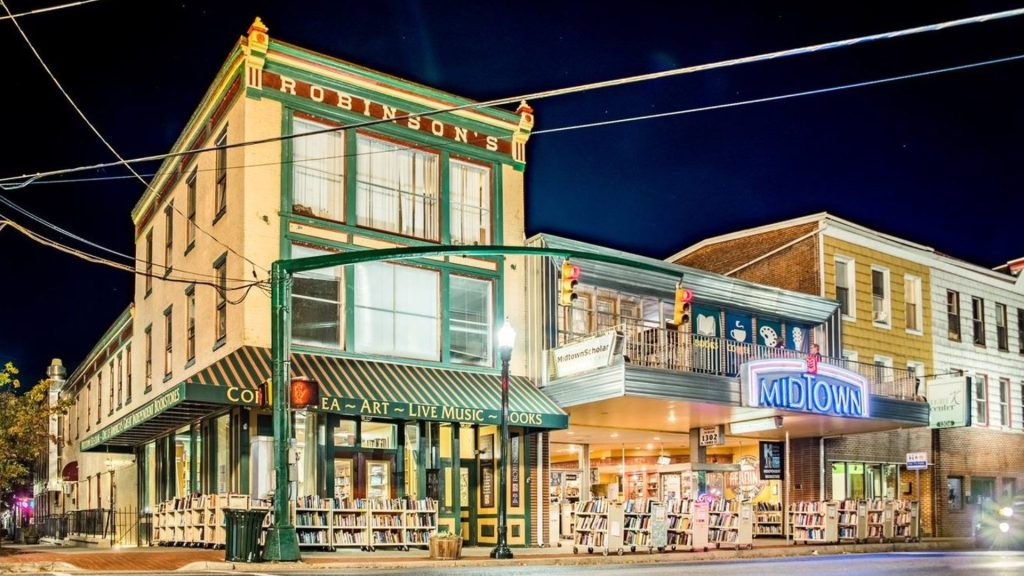
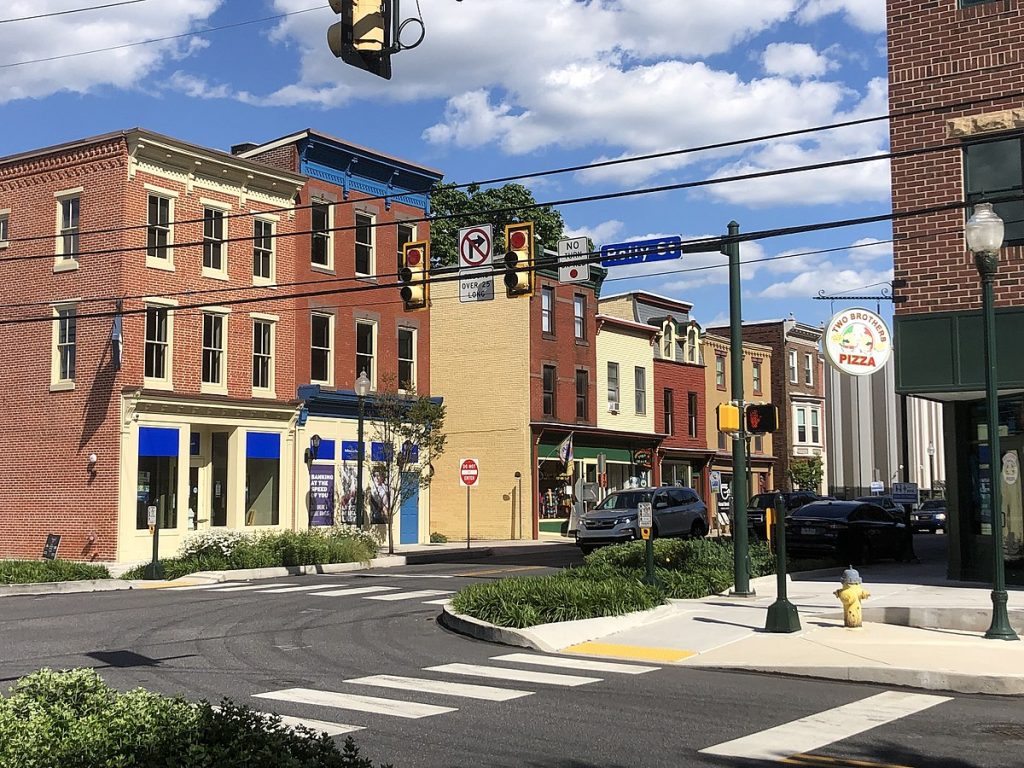
The Midtown neighborhood in Harrisburg, Pennsylvania has always served as a cornerstone of culture and prosperity, long before the city that surrounds it even existed. What began as farmland for the wealthy during early colonial America gradually evolved into the heart of the state’s capitol, bursting at the seams with art, opportunity, and education. Adam Porter, owner of the Midtown Cinema, spoke to the nature of the neighborhood, referencing former mayor Eric Papenfuse by saying “When the Mayor cut our ribbon at the grand reopening in 2013, he said they named the bookstore that because the Midtown Cinema was already there. They understood placemaking.”
I personally feel this quote highlights the spirit of not only Midtown Scholar, but of the neighborhood at large; digging deeper into Porter’s meaning, the neighborhood was originally referred to as “Uptown,” the term Midtown coming directly from the community. Around the middle of the 20th century, the neighborhood advocacy group Midtown Square Action Council (MSAC) popularized the current name. In an interview held this year on the Midtown Scholars’ YouTube channel, the aforementioned Papenfuse describes community-driven bookstores as a living, breathing part of the area, and that they must remain local in order to properly impact their demographics.
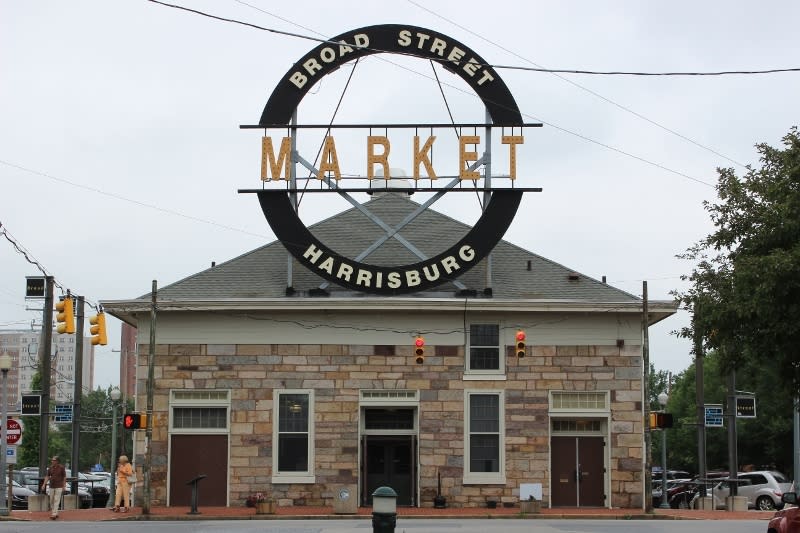
In the same interview, he also discusses how he views chains in relation to independent bookstores, describing that they both serve different interests and demographics, but the independent bookstore seeks to “do what chains can’t do,” and provide their customers with a personalized, individual experience that can help them broaden their sights on education as a whole. This notion harkens back to what Laura Miller covers in chapter two of Reluctant Capitalists, mentioning the difference between independent bookstores and chains, and how it’s almost a David and Goliath situation; while chains are able to sell titles en masse, independent bookstores have the challenge of making a name for themselves, and this crucial dilemma is where the Midtown Scholar’s story begins.
When the Midtown Scholar Bookstore first opened their doors in what co-owner Papenfuse described to be a “half 19th-century townhouse, half 1950s post office” on the corner of 3rd and Reilly in Harrisburg, the two owners never anticipated the allure and reputation their once humble storefront would attain– now serving as one of the premier literature destinations on the east coast. Although the bookstore has only existed for a relatively small amount of time, a little over two decades, the impact they’ve had on the surrounding community is immeasurable.
Through reinvigorating local academia, bringing life to the once abandoned Midtown Historic District, and pioneering the largest annual literature festival in Harrisburg (among many other accomplishments), Midtown Scholar has been vital to the continued growth of this neighborhood. Although the modern store has 15,000 square feet of retail space with over 300,000 titles, Midtown Scholar began as a much smaller endeavor, initially launched as an online bookstore out of the owners’ home.
Before their first brick-and-mortar storefront opened in 2003, owners Catherine Lawrence and Eric Papenfuse had been selling books online since 2001. Operating exclusively out of the couples’ home, a shared love of literature and its impact on society prompted the two to market a broad selection of titles to the general public. At around the same time, Amazon started to gain traction as an online book retailer, which had the potential to threaten business for the Midtown Scholar; instead, this paved the way for the Scholar to differentiate its appeal while remaining successful through their online store, adapting to one of the first major threats to its longevity.
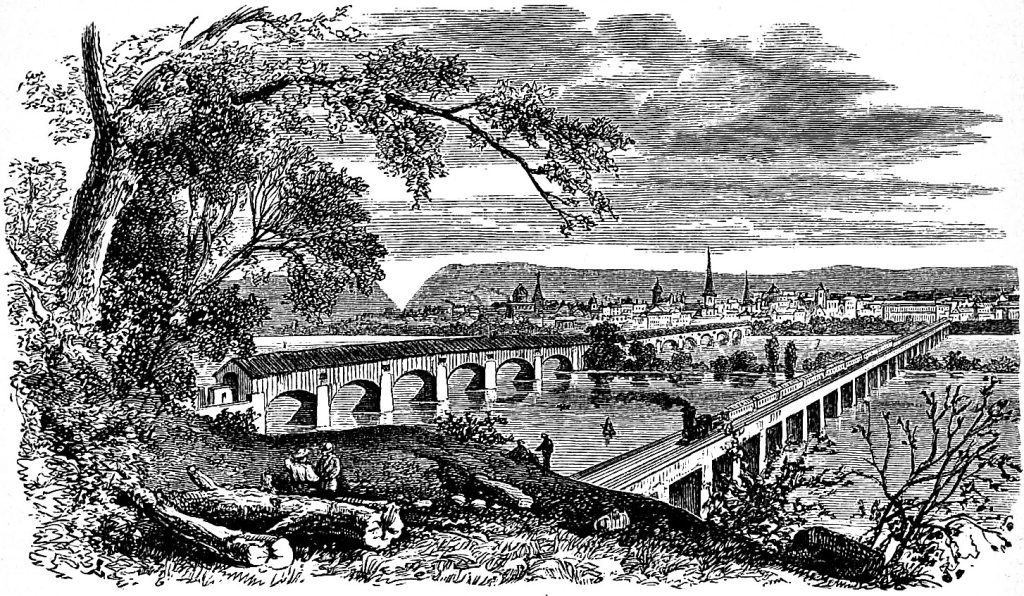
When asked how they were able to compete with digital-retail goliaths and chain bookstores, Lawrence responded by saying that for every chain that sells fifty copies of a book, Midtown Scholar has fifty unique titles instead. This sentiment harkens back to readings we’ve covered, most specifically the excerpt from W. G. Rogers’ Wise Men Fish Here, which stresses the unique and timeless nature of bookselling. Much like the storefront in the essay, Midtown Scholar began small and slowly expanded its space and collections, before gradually snowballing into the beacon of bookselling it stands as today.
W.G. Rogers’ essay places great emphasis on the value of a title– not in price, but in the content it holds– and it would be remiss to ignore that the owners share this sentiment, challenging their average patron to expand their scope of literature, described by Papenfuse as “a different type of shopping,” one that could push the consumer outside of their comfort zone. While they were continually successful with their online bookselling, the owners realized that the wealth and broad nature of texts they possessed– over 15,000 books ranging from academia to fiction to art– appealed to the consumer better when they were able to observe them; to see, feel, and interact with a bookstore that seemed to exist out of time.
After two years of selling books through their website, the owners decided to purchase the aforementioned “1950s post office” in Midtown, converting the loading dock and ground floor to support the online end of the business, and having the top floor become a bookstore reminiscent of the owners’ favorites along the east coast. Lawrence described the state of Midtown as a “book desert” prior to their arrival, being the first independent bookstore opened in the area. The owners remained at this location until early 2007, when in the midst of the real-estate crisis they purchased a run-down furniture warehouse, adjacent to what was once a theater. Renovations began that same year, concluding in 2008, when the modern Midtown Scholar storefront was opened to the public.
Lawrence and Papenfuse went above and beyond in transforming the store to match their vision, renovating both buildings at the new location from top to bottom. They knocked down walls, excavated basements, and transformed the interior fundamentally from what it began as, connecting the two buildings by tunneling through the foundation. The owners described the store as “everything being intentional from the ground up,” showing the heartfelt care they put into fostering a space for book-lovers and scholars alike. As their new location grew and their contents expanded, the owners began to understand the importance of the location they inhabited: Harrisburg, as described by Papenfuse, serves as “a wonderful crossroads on the east coast,” and more specifically to his bookstore, it served as a “catalyst for civic engagement and urban development.”
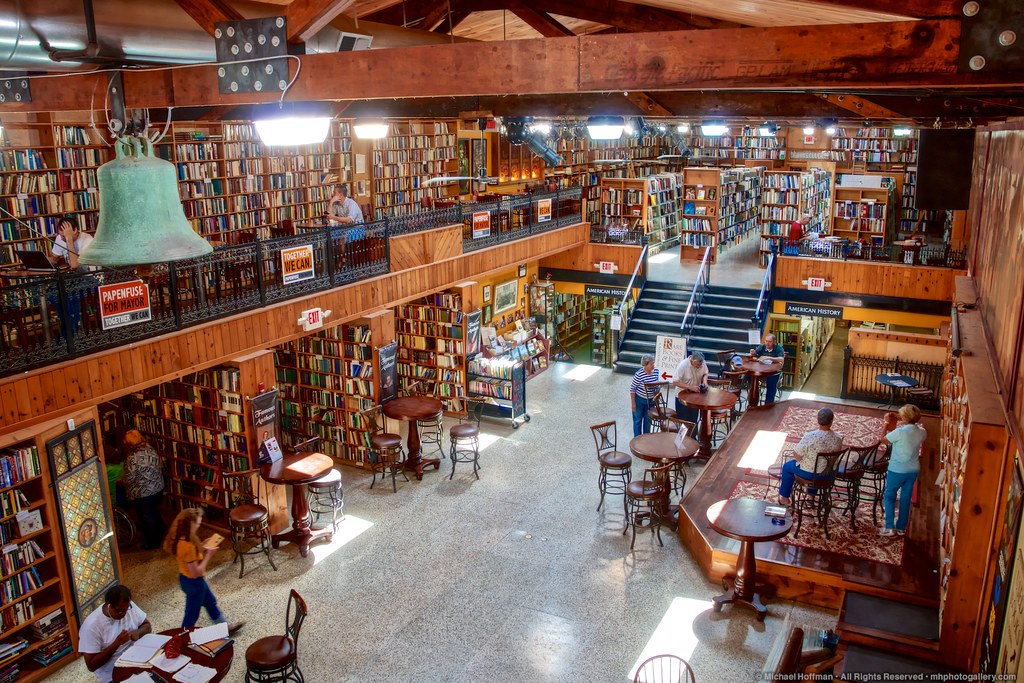
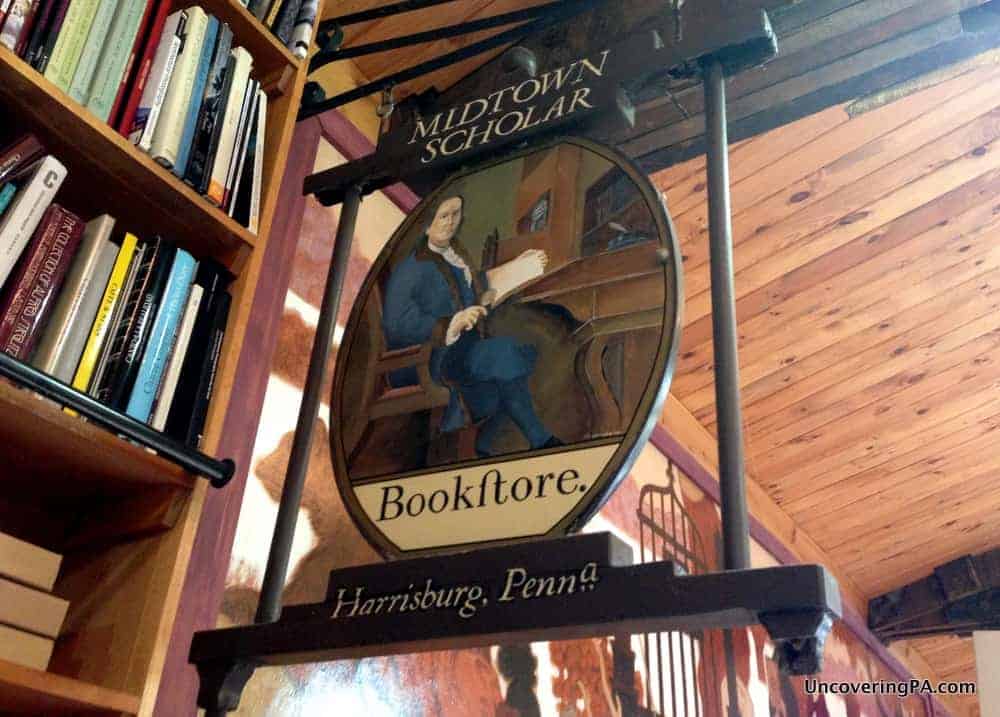
During the COVID-19 Pandemic, however, the Midtown Scholar had to close its doors to the public. Despite this, they still managed to remain in business through their online bookstore, shipping them to people while they quarantined. Quickly making the shift to exclusively online commerce, Midtown Scholar was able to conduct over 300 Zoom interviews with publishers, authors, and other prominent literary figures, along with online events that kept their customers engaged.
Overall, the Midtown Scholar has had an indelible impact on its community throughout its somewhat short lifespan. Papenfuse and Lawrence were the driving force behind creating the Annual Harrisburg Book Festival, which began in 2009; over the years, this event they began has evolved into something so much more, hosting an array of panels, signings, and events for the public. The store itself is dedicated to preserving history, hosting collections of unique, eclectic titles that paint a broad picture of their love of literature. This love of literature which seeps from the very foundation of the Midtown Scholar was the basis of its creation in the first place; literature and their shared love of it brought owners Eric Papenfuse and Catherine Lawrence together, and they hope to share this vision with the greater Harrisburg area through their continued drive to create a space where individuals from all backgrounds can equally pursue education.
Works Cited
“About Us.” Midtown Scholar Bookstore, www.midtownscholar.com/history-and-mission. Accessed 8 Oct. 2023.
Op de Beeck, Nathalie. “U.S. Book Show 2023: Midtown Scholar.” PublishersWeekly.Com, 12 May 2023, www.publishersweekly.com/pw/by-topic/industry-news/bea/article/92294-u-s-book-show-2023-midtown-scholar.html. Accessed 6 Oct. 2023
“LIVE | The Story of an Independent Bookstore with Catherine Lawrence and Eric Papenfuse.” YouTube, YouTube, 27 Apr. 2023, https://www.youtube.com/watch?v=fpdFCTpNQj4. Accessed 8 Oct. 2023.
“Midtown, Harrisburg.” Wikipedia, Wikimedia Foundation, 5 June 2023, en.wikipedia.org/wiki/Midtown,_Harrisburg. Accessed 7 Oct. 2023.
“Eric Papenfuse.” Wikipedia, Wikimedia Foundation, 27 Sept. 2023, en.wikipedia.org/wiki/Eric_Papenfuse#Midtown_Scholar_Bookstore. Accessed 8 Oct. 2023.
Miller, Laura J. Reluctant Capitalists Bookselling and the Culture of Consumption. University of Chicago Press, 2014.
Stabert, Lee. “Rebirth in Midtown Harrisburg.” Keystone Edge – What’s Next & Best in Pennsylvania – Growth, Innovation, and Community News, 17 May 2016, www.keystoneedge.com/2016/05/17/rebirth-in-midtown-harrisburg/.
“Midtown Harrisburg Historic District.” Visit Hershey & Harrisburg – Things To Do In Pennsylvania – Visit Pennsylvania, www.visithersheyharrisburg.org/listings/midtown-harrisburg-historic-district/2076/#:~:text=Originally%20comprised%20of%20farmland%20held,majority%20dating%20to%20around%201875. Accessed 9 Oct. 2023.
Images Used
https://www.visithersheyharrisburg.org/listings/midtown-harrisburg-historic-district/2076/
https://en.wikipedia.org/wiki/Midtown,_Harrisburg
https://en.wikipedia.org/wiki/Old_Midtown_Historic_District_%28Harrisburg%29
https://www.reverberations.net/midtown-harrisburg-pennsylvania/

0 Comments